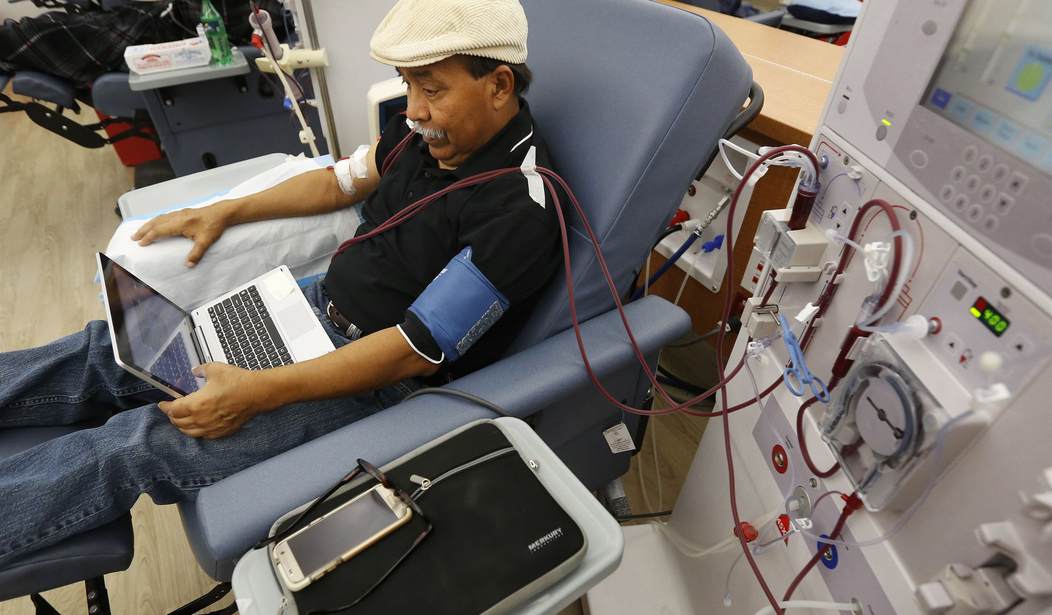This year has posed a variety of dangerous new challenges for Americans. Many have lost their jobs as states grapple with the economic fallout of the COVID-19 pandemic, and with worries about stable employment often come worries about healthcare. We are at a moment where we can ill afford to limit Americans’ access to critical care services. Unfortunately, when it comes to patients with end-stage renal disease (ESRD) and those who need regular dialysis treatments, we are coming up short.
That’s because in May, the Centers for Medicare and Medicaid Services (CMS) announced changes to network adequacy requirements – rules which determine how networks can provide reasonable access to care – for dialysis clinics included in Medicare Advantage plans. This could limit the number of facilities available to ESRD patients and make it harder for them to receive necessary care. Given that those with ESRD are at a higher risk for serious problems resulting from COVID-19, we simply cannot allow that to happen.
This change would make it so that dialysis facilities covered within Medicare Advantage plan networks are not subject to time and distance limits, which outline how far patients can be required to travel to receive certain types of care. Instead, those limits will be replaced by a standard based on broader health care patterns in a particular community. This standard, which is usually reserved only for types of care that don’t require frequent travel, makes it possible for the private insurance companies who issue Medicare Advantage plans to cut costs by including fewer dialysis facilities and doctors within the plan’s network.
Given the critical nature of dialysis and the care dialysis centers provide, this could be incredibly detrimental to ESRD patients. Many have to travel to clinics three or more times a week for treatments that can last several hours. Requiring them to travel even farther for these treatments would make an already time-consuming and draining experience even more difficult. Beyond this, even those ESRD patients who do in-home dialysis still need to be able to access a clinic in case something goes wrong, or for the check-ins that they are required to have with their doctors.
Recommended
This change will ultimately disincentivize ESRD patients from pursuing Medicare Advantage plans at all, and in the process take away options for care that they pushed hard to receive.
In 2016, thanks in great part to the efforts of ESRD patients across the U.S., a bipartisan group of members of Congress passed the 21st Century Cures Act, which opened Medicare Advantage enrollment to thousands of dialysis patients who previously did not qualify for those plans. The first period for them to enroll is set to take place in October for plans beginning in 2021. Unfortunately, less than six months before that, the Administration has essentially taken this opportunity away, compromising the level of care available to ESRD patients.
With Medicare Advantage plans – which are offered through private health insurers – patients are able to shop for the plan most suited to their needs, often with more benefits and at a lower cost out-of-pocket than is available through standard Medicare. For many, this will not be an option, as Medicare Advantage networks will be less likely to include their doctors thanks to this move from CMS.
Understandably, ESRD patients are pushing back. After all, this is another in a long line of regulatory decisions that fail to address their needs and leave them behind. Dialysis Patient Citizens, which is a group that advocates for ESRD patients, has filed a lawsuit against CMS and Administrator Seema Verma to draw attention to how this change will hurt dialysis patients and, hopefully, see this new regulation overturned.
We are at a critical point for health care in the U.S., and we simply cannot afford to treat some patients better than others. Sadly, this CMS decision does just that, and will only make it harder for ESRD patients to readily access the care they rely on. The right move now is to show ESRD patients that we are just as dedicated to their health as we are any other patients and overturn this decision.
Jesse Grady is a former staff member of President Donald Trump’s 2016 campaign and is a former Regional Director for the Republican Party of Texas.
























Join the conversation as a VIP Member